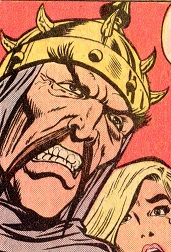
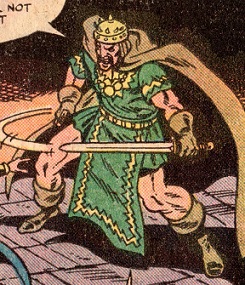
GUNTHER
Real Name: Gunther
Identity/Class: Human;
presumably the fifth century AD (see
comments)
Occupation: Lord of the Gibichung clan
Group Membership: Lord of the Gibichung clan
Affiliations: He worshiped
the Asgardian gods, having named Odin specifically.
formerly Hagen,
Siegfried
Enemies: Brunnhilde the Valkyrie (in her Brunnhilda incarnation), Hagen, Siegfried (a mortal incarnation of Thor Odinson)
Known Relatives: Gutruna
(sister), Hagen (maternal half-brother);
unidentified mother and father (they were named
Gibich and Grimhilde in Wagner's saga)
Aliases: Lord Gunther (see comments for names in history and other stories)
Base of Operations: Gibichung clan castle along the river Rhine (see comments)
First Appearance: Gunther is
apparently a historical figure active in the 5th century AD;
(in writing) Lex Burgundionum (late 5th to
early 6th century AD);
(Legendary Gunther) Nibelungenlied
(circa 1200 AD);
(Wagner's Gunther) Götterdämmerung (The
German word for Ragnarok, or The Twilight of the Gods), the final part
in the opera "Der Ring Des Nibelung" (The Ring of the Nibelung) opera (August 17, 1876);
(Marvel's Gunther) Thor I#299 (September, 1980)
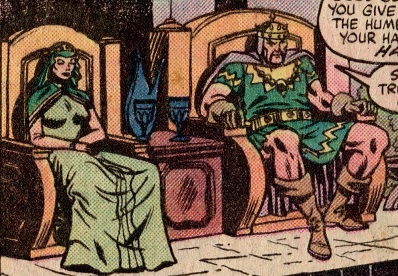
Powers/Abilities: Gunther had some experience as a warrior, hunter, and equestrian. He used spears and swords.
Though prideful of his honor, he was willing to betray and manipulate others for his own ends.
Height: Unrevealed (approximately 6'; Siegfried
looked to be slightly taller than Gunther was)
Weight: Unrevealed (approximately 180 lbs.)
Eyes: Dark, possibly brown
Hair: Black mustache (any other hair on his head was covered by
the cloth under his crown)
History:
(Thor I#299
(fb) - BTS) - Gunther was the brother of Gutruna, and the half-brother
of Hagen via a shared mother. Gunther became the leader of the Gibichung
clan.
"An ill wind had long blown" between Hagen and Gunther, and Gunther considered Hagen to be treacherous.
(Thor I#299 (fb)) - Appearing in the courtyard of the Gibichung castle, Hagen knelt before Gunther and asked him to give audience to his humble words. When Gunther begrudgingly approved, Hagen told Gunther and Gutruna that he had realized that the fame of the Gibichungs could spread no further until they both had found mates worthy of their station.
He then told them of the beautiful Brunnhilda who dwelt upon the Fire Mountain; admitting he lacked the might to brave the flames, Gunther asked how he might claim her. Hagen then told of the great hero Siegfried, noting the potion he had that could enslave Siegfried, and that he had arranged for Siegfried's arrival.
(Thor I#299 (fb) - BTS) - Seeking adventures and a repast, Siegfried stopped at Gunther's castle. Though guards barred his trespass verbally and physically, Siegfried easily overwhelmed the lot of them.
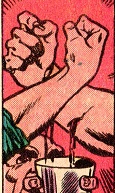
(Thor I#299 (fb)) - Hagen then brought Siegfried before Gunther, who apologized for the testing to prove his mettle, and as recompense, offered Siegfried anything in his kingdom. When Siegfried noted that he craved not wealth -- as he had not kept the gold plunder of the Nibelung clan -- but only adventure, Gunther questioned Siegfried further, causing him to admit he had taken the Tarnhelm and the gold ring (the Ring of Power), but that he had given the latter away. Praising Siegfried as being truly rich for not requiring objects of wealth, Gunther arranged a toast to Siegfried's exploits before seeking to devise another adventure for him, leading Siegfried to drink Hagen's potion-tainted wine. Siegfried swiftly forgot Brunnhilda as soon as he tasted the wine, after which he gazed upon and fell passionately in love with Gutruna.
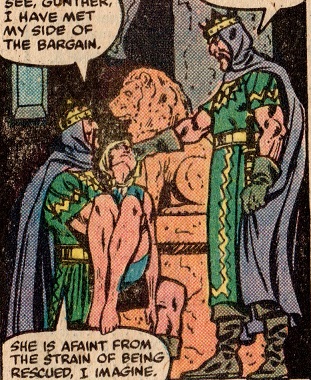
At Siegfried's questioning, Gutruna admitted that she was available, but that it would be unseemly for her to marry before her brother did. When Siegfried asked why Gunther had not taken a wife, Gunther told him the woman he would wed was a prisoner on a mountain of fire, which he feared. Though the scenario seemed vaguely familiar, Siegfried announced that he feared nothing and would happily ascend the mountain for him if he could have Gutruna's hand in marriage.
Gunther agreed and led Siegfried to join him in a blood oath to this agreement, vowing to be true to each other unto death. Hagen then advised Siegfried to use the Tarnhelm to alter his appearance to take Gunther's form.
After Siegfried departed, Hagen plotted to trick Gunther into slaying Siegfried, enabling Hagen to claim the Ring of the Nibelung, which he would use to rule all gods and men.
(Thor I#299 (fb) - BTS) - In the form of Gunther, Siegfried captured Brunnhilda.
(Thor I#299 (fb)) - At the next dawn, Siegfried (still in Gunther's form) returned to the Gibichung castle, after which he delivered Brunnhilda to Gunther. When Gunther asked why she was sleeping, Siegfried explained that she was afaint from the strain of the rescue. Gunther had handmaidens take Brunnhilda to her new quarters and prepare her for that evening's wedding feast, and he had Siegfried return to his own appearance.
The dual wedding of Gunther to Brunnhilda and of Siegfried to Gutruna was thus planned. Pleased with Brunnhilda's beauty and with how Siegfried was smitten with Gutruna, Gunther assured Hagen he would be richly rewarded for his counsel.
(Thor I#299 (fb) - BTS) - Gunther summoned the entire Gibichung clan to the wedding banquet, and that night festivities lurched into full swing with a feast.
(Thor I#299 (fb)) - The dual wedding commenced with Hagen presiding, and Gunther accepted Brunnhilda as his wife. However, as Brunnhilda regained her wits, she expressed her confusion as she insisted Siegfried was her lover. Although Siegfried denied this (as he had no memory of her), Brunnhilda insisted that he had pledged her his love and even shared with her "his manly company for a night." Distraught, Gunther announced that he was undone and that his wedding was spoiled.
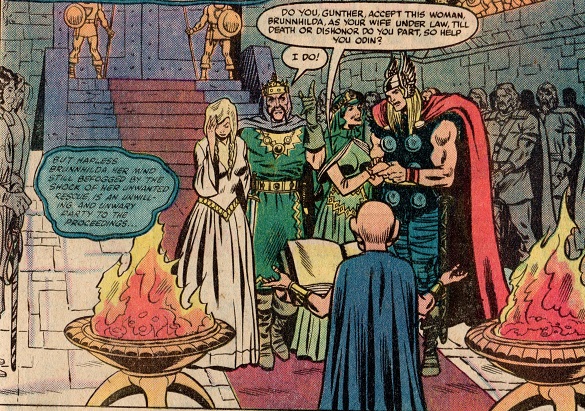
Though Siegfried vowed by their oath that he had never thus touched Brunnhilda, Hagen advised Gunther that Siegfried possessed the ring Brunnhilda had held, indicating that it was a symbol of her maidenhood. When Brunnhilda argued that it was Gunther who had taken her ring, Gunther incorrectly reasoned that Siegfried had had his way with Brunnhilda while disguised as Gunther the previous night. Striving to salvage some dignity, Gunther ordered his guards to slay Siegfried for violating their blood oath by defiling his bride.
As Siegfried proceeded to rout all of his opponents, a tearful Brunnhilda -- distraught by Siegfried's apparent betrayal -- unwittingly admitted that he was indeed charmed, impervious to all harm provided he never turned his back on his foe; Hagen overheard this revelation.
Gutruna urged Gunther to hold back his men, as they clearly could not win and that this slaughter was as much on his hands as Siegfried's. Gunther asked if she still loved this man who had dishonored their house, but she reminded him of his own dishonorable use of a potion to manipulate Siegfried. Considering that if Siegfried finished with his men, he might turn on their lord, Gunther called off his men and offered Siegfried new terms: Though he knew not but intended to find out his involvement with Brunnhilda, he instructed Siegfried to depart forever with Gutruna.
Siegfried accepted and left immediately, but after hearing Brunnhilda's lamentation over losing Siegfried, Gunther wondered whether Siegfried was that irresistible or if there might have been more between them. Hagen told Gunther it mattered not and then assured Gunther he could make Brunnhilda his with a sip of his potion, and that he now knew how to kill Siegfried.
(Thor I#300 (fb) - BTS) - Gunther decided to make amends with Siegfried for his sister's sake, and he told Hagen he no longer wanted to kill Siegfried.
Hagen and Gunther went hunting, capturing a fowl of some sort.
(Thor I#300 (fb)) - Hagen and Gunther approached Siegfried, and Gunther noted that he had come to make amends, as it was unseemly to be an enemy to his sister's future husband and that he had come to accept that Siegfried had done nothing to break his oath to him. They invited Siegfried to dine with them on the bird they had caught.
As Siegfried was distracted in conversation with Gunther, Hagen rushed forward and shoved his spear through Siegfried's back; Siegfried died seconds later.
Gunther chastised Hagen, asking if it was not enough that they had tricked Siegfried into giving up his true love, Brunnhilda, to him. Promising Siegfried a Viking's funeral, Gunther then lifted Siegfried's body atop his steed and carried him back to the castle.
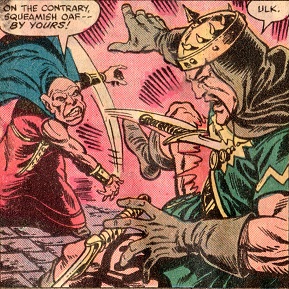
There, Gunther told Gutruna that Siegfried had been slain by a wild beast..."A wild beast named Hagen!"
However, as Gunther drew his sword, announcing that he was severing the bloodline between them with Hagen's death, Hagen swiftly pulled his dagger and hurled it into Gunther's chest, killing him.
Gutruna lamented losing a husband and a brother on the same day.
Comments: Created by unidentified Norse persons in the Nibelungenlied (more on that below);
adapted by Richard Wagner in his Ring of the Nibelung
trilogy (more on
that below);
adapted to Marvel from Wagner's version by Roy Thomas, Keith Pollard, and Chic Stone.
For
this and all profiles related to the Ring of the Nibelung, you
should open up another page in your browser and load Wagner's "Ride
of the Valkyrie"
Yes, this is Elmer Fudd's "Kill the Wabbit"
song...
These stories were among those told to Thor by the Eye of Odin, and the events therein, particularly the origins of the current Odinincarnation, have been called into question.
Courtesy of Wikipedia.
Götterdämmerung (German for the Twilight of the Gods), is the last in Richard Wagner's cycle of four music dramas titled Der Ring Des Nibelungen (The Ring of the Nibelung, or The Ring for short). It received its premiere at the Bayreuth Festspielhaus on 17 August 1876, as part of the first complete performance of the Ring.
The title is a translation into German of the Old Norse phrase Ragnarök, which in Norse mythology refers to a prophesied war among various beings and gods that ultimately results in the burning, immersion in water, and renewal of the world. However, as with the rest of the Ring, Wagner's account diverges significantly from his Old Norse sources.
The Ring of the Nibelung comes, in a very general way, from the old Norse/Germanic legend of the Nibelungenlied ("The Song of the Dwarves").
Historical Gunther
Gundaharius
or Gundahar (d. 437),
better known by his legendary names Gunther
(Middle
High German Gunther)
or Gunnar (Old
Norse Gunnarr),
was a historical King
of Burgundy in the early 5th century.
Burgundy is a historical territory and a former administrative region of France. It takes its name from the Burgundians, an East Germanic people who moved westwards beyond the Rhine during the late Roman period.
Gundahar is the first king of Burgundy to be historically attested. It is unclear if he ruled alone or if he may have ruled together with brothers, as occurs in the heroic tradition; the title φύλαρχος (phylarchos) given to him by Olympiodorus of Thebes may suggest he was not the sole ruler. In Prosper of Aquitaine he is identified as rex (king).
A majority of the Burgundians crossed the Rhine in 406/407, together with numerous other Germanic tribes. Their king Gundahar is first attested in 411 as cooperating with Goar, king of the Alans, to proclaim Jovinus as a new emperor in the province Germania Inferior on the lower Rhine. He is attested as being involved in Jovinus's campaigns in southern Gaul. Following Jovinus's defeat in 413, the Roman magister militum Constantius settled the Burgundians on the left bank of the Rhine as Roman foederati. Based on the later heroic tradition, many scholars identify their area of settlement as around Worms, though some scholars have argued in favor of other locations. Worms is a city in Rhineland-Palatinate, Germany, situated on the Upper Rhine about 60 kilometres south-southwest of Frankfurt-am-Main.
In the 430s, the Burgundians came under increasing pressure from the Huns; likely as a reaction to this Gundahar attacked the Roman province Belgica Prima (based around Trier) in 435.[7] The Burgundians were defeated by the Roman general Flavius Aetius, who nevertheless confirmed Gundahar and his people's rights to their kingdom. However, the next year (436) Aetius, accompanied by Hunnish mercenaries, attacked and destroyed the Burgundian kingdom. According to Prosper of Aquitaine, Gundahar and the majority of his people found their deaths in Aetius's attack.
Aetius resettled the survivors of the destruction of the Burgundian kingdom in Savoy on the upper Rhone. The memory of Gundahar and his downfall was likely preserved by these survivors, as well as by observers from neighboring Germanic tribes.
The late fifth-/early-sixth century Lex Burgundionum, produced by the Burgundian king Gundobad at the Burgundians' new kingdom, mentions four older Burgundian kings: Gibica, Gundomar, Gislaharius, and Gundahar. It makes no mention of any familial relationship between the kings, however. In the heroic tradition, Gibica (Gibeche/Gjúki) appears as Gundahar's father, while Gundomar (Guthorm/Gernot) and Gislaharius (Giselher) appear as his brothers and co-kings.
The historical Gundahar's death became the basis for a legend in which the legendary Gunther finds his death at the court of Attila the Hun (Etzel/Atli). The character also became attached to other legends: most notably he is associated with Siegfried/Sigurd and Brunhild, and is implicated in Sigurd's murder. He also appears as an adversary in the legend of Walter of Aquitaine. It is generally assumed that Gunther's involvement in these other legends, in which he plays a secondary or antagonistic role, is a later development. Gunther's importance in the story of the destruction of the Burgundians also waned with time.
Gunther appears as a legendary character in Latin, Middle High German, Old Norse, and Old English texts, as well as in various pictorial depictions from Scandinavia. Most significantly, he plays a role in the German Nibelungenlied, the medieval Latin Waltharius, and the Old Norse Poetic Edda and Völsunga saga. He also plays an important role in Richard Wagner's operatic Ring cycle, which is based on the medieval legends of Sigurd.
Gunther
in Old English poems
In the fragmentary Old English poem Waldere (c. 1000), the Old English attestation of the story of Walter of Aquitaine (see Waltharius under Continental traditions), Guðhere (Gunther) is preparing to attack Waldere (Walter). He refuses the gifts that Walther offers him to make peace and is portrayed as boastful. It appears that Guðhere wishes to take the gold that Waldere has with him.
The narrator of the Old English poem Widsith reports that he was given a ring by Guðhere when he visited the Burgundians (Burgendas).
The Waltharius is a Latin epic that reworks the legend of Walter of Aquitaine; it is conventionally dated to around 1000, but some scholars argue that it was produced in the Carolingian period.[15]
In Waltharius, Gunther (as Guntharius) appears as a king of the Franks with his capital at Worms. At the beginning of the poem, Gunther's father Gibeche (Gibico) has sent his vassal Hagen (Hageno) to the Huns as a hostage because Gunther is still too young. Hagen later flees back to Gibeche's kingdom. When Walter and his love Hiltgunt flee the Huns, taking much treasure, they enter into Gunther's kingdom by crossing the Rhine by Worms. They sell the ferryman fish they had brought with them in exchange for passage, and the ferryman brings these fish, which do not live in the area, to the king. Hagen tells Gunther that this must be Walter, and Gunther declares that now he can reclaim the gold that his father had paid to Attila in tribute. Although Hagen advises against it, the king sets out with some warriors to apprehend Walter and Hiltgunt. When Gunther finds the pair, he demands that Walter give him Hiltgunt and the gold. Walter refuses and kills Gunther's warriors as they attack, despite Gunther's encouragements. Finally, only Gunther and Hagen are left alive; they allow Walter to leave, then attack him from behind. Walter cuts off Gunther's leg, but Hagen saves the king's life when Walter wishes to kill him. After both Hagen and Walter have maimed each other, the fighting stops and Hiltgunt tends the warriors' wounds. The warriors then part in friendship.
The story presents a contrast to Gunther's destruction in that he is attracted by the Huns' gold rather than the other way around. Like Gunther's role in the death of Siegfried, his role in the legend of Walter places him in a negative light
Gunther in the
Nibelungenlied
Gunther's story next appears in writing in the Nibelungenlied from c. 1200. In it, Gunther is the king of the Burgundians with a capital at Worms. He is the son of King Dancrat and Queen Ute and rules together with his royal brothers Giselher and Gernot, and his sister is named Kriemhild. When Siegfried comes to Worms to woo Kriemhild, he first challenges Gunther as king before the situation is resolved peacefully. Gunther subsequently relies on Siegfried to defeat his enemies the Saxons and Danes. Eventually, Gunther offers to allow Siegfried to marry Kriemhild if Siegfried first helps him woo the queen of Iceland, Brunhild. Brunhild has set various martial and physical challenges that any suitor must accomplish, or else she will kill him. Siegfried uses his cloak of invisibility (Tarnkappe) to allow Gunther to accomplish each challenge, and Brunhild is forced to marry Gunther. She refuses, however, to sleep with Gunther on her wedding night, tying him up and hanging him from a hook. Gunther again enlists Siegfried's help, who takes Gunther's shape and overpowers Brunhild so that Gunther can then sleep with her.
Some time later, Kriemhild and Brunhild quarrel, and Kriemhild tells Brunhild that Siegfried and not Gunther took her virginity. Brunhild complains to Gunther, who causes Siegfried to publicly swear that this is not true. Brunhild and Gunther's vassal Hagen, however, are not satisfied, and convince Gunther to have Siegfried murdered while on a hunt. Hagen kills Siegfried. He later arranges to steal the hoard of the Nibelungs that rightfully belongs to Kriemhild as Siegfried's widow. After some time, Kriemhild is persuaded to be reconciled with Gunther, but not Hagen. After she has been married to King Etzel of the Huns, she invites her brothers to visit, plotting revenge. Gunther accepts this invitation despite Hagen's warning, and the Burgundians trek from Worms to Etzelburg (Buda). Gunther can be said to play a secondary role to Hagen in the conclusion of the Nibelungenlied. When fighting begins, Gunther fights bravely. When only he and Hagen are left alive, Dietrich von Bern captures the two. Told by Hagen that he will only reveal the location of the hoard of the Nibelungs once Gunther is dead, Kriemhild has her brother beheaded.
Although the þiðrekssaga (c. 1250) is written in Old Norse, the majority of the material is translated from German (particularly Low German) oral tales, as well as possibly some from German written sources such as the Nibelungenlied. Therefore, it is included here.
Gunnar (Gunther) is a king of the Niflungs who live in northern Germany at Niflungaland, with a capital at Verniza (Worms). He is the son of King Aldrian and Queen Oda and brother of Grimhild (Kriemhild), Gernoz (Gernot), and Gisler (Giselher), and half-brother of Högni (Hagen). In another version of the saga, his father is Irung.
Gunnar first appears when he takes part in the expedition of twelve heroes to Bertangenland organized by Thidrek (Dietrich von Bern). He loses in combat against one of King Isung's sons, but is freed once Thidrek defeats Sigurd (Siegfried). Thidrek and Sigurd then accompany Gunnar back to his court, and Sigurd marries Gunnar's sister Grimhild. Sigurd suggests that Gunnar should marry Brunhild, and Gunnar agrees. Although Brunhild is initially reluctant, saying Sigurd had promised to marry her, she eventually agrees. However, she refuses to sleep with Gunnar and overpowers him with her immense strength when he tries to.Gunnar then tells Sigurd to take Gunnar's shape and deflower Brunhild for him. This takes away Brunhild's strength; after this, Brunhild is brought back to Gunnar's court.
After some time conflict erupts between Brunhild and Grimhild over the irrespective statuses at court. The quarrel causes Grimhild to reveal to Brunhild that Sigurd took her virginity, not Gunnar. When Gunnar hears of this, he and Högni decide to kill Sigurd. Högni then kills Sigurd on a hunt, and Gunnar and he place the corpse in Grimhild's bed. Later,Grimhild is married to Atli (Attila), and she invites her brothers to visit her and her new husband's court at Susat (Soest). She intends to kill them, while Atli desires the hoard they had taken from Sigurd. Gunnar agrees to come despite Högni's warnings. As in the Nibeungenlied, Gunnar plays a secondary role to Högni in the action at Atli's court. Once fighting breaks out at the Hunnish court, Gunnar is taken captive. Grimhild tells Atli to throw him into a tower full of snakes, where he dies.
The author of the saga has made a number of changes to create a more or less coherent story out of the many oral and possibly written sources that he used to create the saga. The author mentions alternative Scandinavian versions of many of these same tales, and appears to have changed some details to match the stories known by his Scandinavian audience. The saga's version of the downfall of the Burgundians represents a unique mix of elements known from the Norse and continental traditions. Some elements that are closer to the Norse version may reflect genuine Low German traditions: a "snake tower" (Schlangenturm) is attested as having existed in Soest until the end of the eighteenth century.
Gunther in the
Poetic Edda
The Poetic Edda, a collection of heroic and mythological Nordic poems, appears to have been compiled around 1270 in Iceland, and assembles mythological and heroic songs of various ages. As elsewhere in the Scandinavian tradition, Gunnar is the son of Gjukiand the brother of Gudrun and Högni. Depending on the poem Guthorm is either his full brother, step-brother, or half-brother. A sister Gullrönd also appears in one poem.
A prophecy that Sigurd receives about his future life and deeds, Sigurd learns of his future marriage to Gudrun and his role taking Gunnar's place in his wooing of Brunhild, followed by his murder.
This is only preserved fragmentarily: the surviving part of the poem tells the story of Sigurd's murder. The fragment opens with Högni questioning Gunnar's decision to have Sigurd murdered, believing that Brunhild's claim that Sigurd slept with her might be false. Soon after the murder occurs, Gunnar shows himself to be deeply concerned about the future, while Brunhild admits that she lied to have Sigurd killed. Gunnar plays only a supporting role in the surviving portion of the poem, with Brunhild and Gudrun being the more important characters.
Retells the story of Sigurd's life from his arrival at Gunnar's court to his murder. On account of its content, which dwells on psychological motivation, and its style, this poem is generally not thought to be very old.
Sigurd and Gunnar become friends when Sigurd comes to Gunnar's court, and Sigurd aids Gunnar in his wooing of Brunhild. Sigurd marries Gudrun, but Brunhild desires him for herself. In her jealousy, she threatens to leave Gunnar if he does not have Sigurd murdered. Gunnar and Högni decide that the death of Sigurd is not as bad as losing the queen, so they have their brother Guthorm murder him in his bed. Brunhild laughs loudly when she hears Gudrun's wailing, and Gunnar insults her and makes accusations against her when he hears her laugh. Brunhild tells him that she never wanted to marry him, but was forced to by her brother Atli. She then kills herself in spite of Gunnar's attempts to change her mind.
A short prose section connecting the death of Sigurd to the following poems about the Burgundians (Niflungs) and Atli (Attila). Atli, who is Brunhild's brother, blames Gunnar for Brunhild's death, and in order to placate him Gunnar marries Gudrun to Atli. Gunnar desires to marry Brunhild and Atli's sister Oddrun, but Atli refuses, so he and Oddrun become lovers. Some time later, Atli invites Gunnar and Högni to visit him, and they go despite a warning from Gudrun. Gunnar and Högni are taken prisoner, and Gunnar is thrown into a snake pit: he puts the snakes to sleep with his harp, but in the end one bites him in the liver, and he dies.
Atli's sister Oddrun narrates the story of her love for Gunnar. She tells how Atli refused to marry her to Gunnar after her sister Brunhild's death. She and Gunnar nevertheless begin an affair, sleeping together until one day they are discovered. In anger, Atli then murders Gunnar and Högni, throwing Gunnar into a snake pit. Oddrun says that she tries to help Gunnar escape the snake pit, but by the time she got there he was already dead, as her mother had turned into a snake and bitten him.
Oddrun appears to be a late addition to the legend, perhaps created so that the poet could "tell the story of the fall of the Nibelungs from a different point of view." She also provides an additional reason forenmity between Gunnar and Atli besides Atli's lust for treasure in Gunnar's role as Oddrun's lover.
Atli invites Högni and Gunnar to his hall, claiming to wish to offer them great riches, but actually intending to kill them. Gunnar decides to come although Gudrun has sent them a warning. They cross through Myrkviðr (mirkwood) on their way to Atli's court. Once they arrive, Atli captures Gunnar and Högni. He demands Gunnar's hoard of gold, but Gunnar says he will not tell Atli until Högni is dead. Atli then kills Högni and brings his heart to Gunnar, who laughs and says now only he knows the secret of the hoard's location. He refuses to tell Atli, so Atli has him thrown into a snake pit. Gunnar plays his harp there until he is bitten by a snake and dies.
Atlakviða is commonly supposed to be one of the oldest poems in the Poetic Edda, possibly dating from the ninth century. The poem is particularly notable in that Sigurd is not mentioned at all. The presence of the forest Myrkviðr and the timelessness of the story show the poem to have moved into the realm of myth rather than historical legend. Alternatively, Myrkviðr could refer to the Erzgebirge, which are called Miriquidui by the historian Thietmar of Merseburg in the eleventh century.
Tells the same story as Atlakviða with several important differences. When Gunnar receives Atli's invitation, he and Högni shrug off the warning sent by Gudrun. They then ignore the runes read by Högni's wife Kostbera telling them not to go, and an ominous dream by Gunnar's wife Glaumvör. When they arrive at Atli's court, Atli's messenger, who has accompanied them, announces that they must die. Gunnar and Högni kill him. Gudrun attempts to negotiate between the two sides but is unsuccessful; she fights with her brothers until they are captured. Atli then has Gunnar and Högni killed in order to spite Gudrun. Gunnar is thrown into a snake pit, where he plays the harp with his toes as his hands are bound. He is bitten and dies.
Gunther
in the Volsunga saga
The Völsunga saga tells a longer prose version of Gunther's life and deeds. It follows the plot given in the Poetic Edda fairly closely, although there is no indication that the author knew the other text. The author appears to have been working in Norway and to have known the Thidrekssaga (c. 1250), a translation of continental Germanic traditions into Old Norse (see þiðrekssaga above). Therefore the Völsunga Saga is dated to sometime in the second half of the thirteenth century.
Gunnar is portrayed as the son of Gjúki and Grimhild and brother of Högni, Gudrun, and Guthorm. After Sigurd's arrival at the Burgundian court, Gunnar is encouraged by Grimhild to marry Brynhild. Brynhild, however, refuses to marry any man but the one who can ride through a wall of flame. Gunnar is unable to do this, and so Sigurd takes his shape and performs the action for him. Brynhild is thus forced to marry Gunnar. Some time later, Gudrun and Brynhild quarrel about whether Sigurd or Gunnar has the highest rank at the court. Gudrun then reveals the deception to Brynhild, who demands vengeance from Gunnar. He is unable to change her mind, and she demands that he kill Sigurd. Gunnar and Högni decide that their younger brother Guthorm, who has not sworn any oaths to Sigurd, should perform the murder. They feed him with wolf meat to make him more ferocious, then send him to kill Sigurd in his bed. After the murder, Brynhild commits suicide and prophesies Gunnar's fate.
In order to be reconciled to Brynhild's brother Atli for her death, Gunnar arranges for Sigurd's widow, his sister Gudrun, to marry Atli. He also seeks to marry Atli's other sister Oddrun, but Atli refuses and the two begin an affair. Gunnar instead marries the woman Glaumvör. After some time, desiring to avenge his sister and to gain Gunnar's treasure, Atli invites Gunnar and Högni to his court, intending to kill them. Gunnar is suspicious and Gudrun has tried to warn them not to come, but once he and Högni are drunk, Atli's messenger convinces them to accept the invitation. In spite of the warnings of their wives, Gunnar and Högni set out for Atli's court. Once they arrive, the messenger reveals that it is a trap, and they kill him. Atli demands the treasure that Gunnar took for Sigurd, and when Gunnar refuses, they begin to fight. Eventually, Gunnar and Högni are captured. Gunnar says he will not tell Atli where the hoard is unless he sees Högni's heart. When he is finally shown the heart, Gunnar laughs and says that now only he knows where the hoard is and he will never tell. Atli then orders Gunnar thrown into a snake pit, where he plays the harp with his toes as his hands are bound. In the end, the snakes kill him.
Gunther
in Wagner's saga
Here Gunther is ruler of the Gibichungs, son of Gibich and Grimhilde. Hagen is his half-brother, his father being the villainous dwarf Alberich. Hagen convinces Gunther and Gutrune to respectively wed Brunhilde and Siegfried, using a love potion on Siegfried to make him forget Brunhilde. After Hagen murders Siegfried, he and Gunther argue over the ring, and Hagen kills Gunther.
The
version
of Gunther in Thor I#299-300 largely follows Wagner's Gotterdamerung.
The primary differences are, in Wagner's version
New images by Ron Fredricks.
Profile by Snood.
CLARIFICATIONS:
Gunther should be distinguished from:
images: (without ads)
Thor I#300, p4, pan5 (main image - Gunther, drawing his sword against Hagen)
Thor I#299, p16, pan1 (headshot - Gunther)
Thor I#299, p3, pan1 (Gunther seated on throne, beside Gutruna [left])
Thor I#299, p6, pan5 (Gunther making blood oath with Siegfried)
Thor I#299, p11, pan1 (Gunther in profile [right], with Siegfried [in Gunther's form] holding Brunnhilda)
Thor I#299, p12, pan1 (wedding)
Thor I#300, p4, pan6 (Gunther, slain by Hagen)
Appearances:
Thor I#299 (September, 1980) - Mark Gruenwald
(writer), Keith Pollard (penciler), Chic Stone
(inker), Jim Salicrup (editor)
Thor I#300 (October, 1980) - Mark Gruenwald &
Ralph Macchio (writers), Keith Pollard (penciler),
Chic Stone (inker), Jim Salicrup (editor)
First posted: 01/22/2019
Last updated: 10/01/2025
Any Additions/Corrections? please let me know.
Non-Marvel
Copyright info
All other characters mentioned or pictured are ™ and © 1941-2099
Marvel Characters, Inc. All Rights Reserved. If you like this stuff, you
should check out the real thing!
Please visit The Marvel Official Site at: http://www.marvel.com
Special Thanks to www.g-mart.com for hosting the Appendix, Master List, etc.!